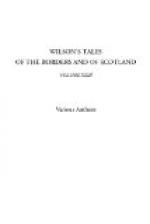“Mrs. Geddes, Johnnie Geddes’s wife, o’ the village o’ Lochee, just twa miles frae that sink o’ sin, Bonnie Dundee. I hae been a great sinner. I kept company wi’ Sandy Simpson when Johnnie was living, and came here to greet owre his grave.”
“A woman!” cried Maule; “then to heaven as fast as your wings will carry you.”
And this man, who braved God, shook with terror before a weak woman; and so did all these brave bacchanals, who, on hearing the horn when no more remained to be condemned, thought their false God had called them, and had returned to witness the object of their new-born fear. Hurrying into the hearse, the party were in a few minutes posting to Dundee in solemn silence, where they arrived about two o’clock, not to resume their orgies, but to separate each for his home, with the elements in him of a sense of retribution, not forgotten for many a day. At the long run the story finishes, and the chronicler, lifting up his hands to heaven, cries, “Is there no end, Lord, is there no end to the profanity of man? Lord, why stayeth the hand of vengeance?”
If guidman Aminadab had known these things—which he couldn’t do, because, like Sir James Colquhoun’s last day (of the session), which he wanted the judges to abolish, this last day (of the world) happened after the said Aminadab was in the habit of seeking Mrs. M’Pherson’s parlour—he would have had greater deductions from his pleasure; for Aminadab read his Bible, and belonged to the first Secession. And so it was better he didn’t, especially on that night when Mrs. M’Pherson had been so extraordinarily condescending to her henchman as to set before him a fine piece of pork, in recognition of his adherence to the resolution of leaving the flesh-pots of Egypt—the old Church. It was a dark night in January. There was a cheerful fire in the neat parlour, and Janet was communicative, if not chatty, in good English, got in George’s kitchen at Kew.
“I would like all this better,” said Aminadab, “if I had not that churchyard to come through; and then there’s that fearful-looking Cradle in the hollow, with four lums like the stumpt posts of a child’s rocking-bed. What is it, Janet?—it’s not a cow-house, nor a henhouse, but a pure dungeon, fearful to free men, who might shudder to be confined in it.”




